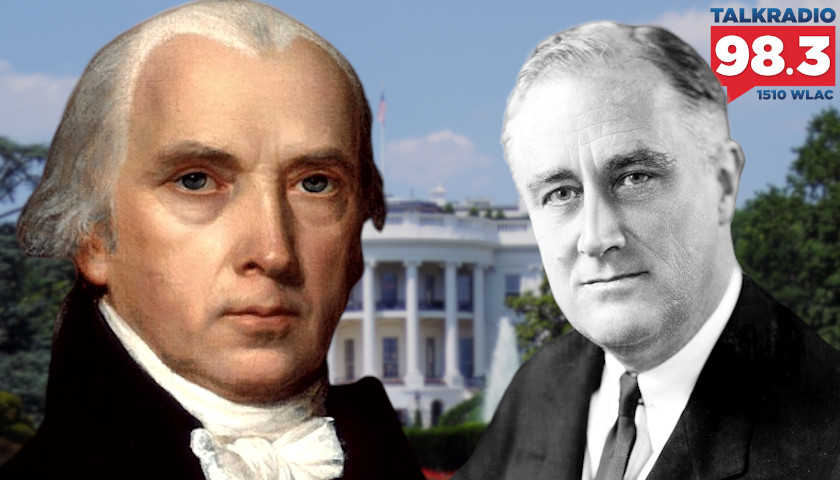Live from Music Row Wednesday morning on The Tennessee Star Report with Michael Patrick Leahy – broadcast on Nashville’s Talk Radio 98.3 and 1510 WLAC weekdays from 5:00 a.m. to 8:00 a.m. – Leahy was joined in studio by all-star panelist, Crom Carmichael.
During the third hour, Leahy and Carmichael, inspired by an article written by Scott Rasmussen, the duo discussed the progressive movement versus the Madisonian checks and balances concept. Carmichael dove deep into the differences of self-interest and selfishness as they pertain to a free market place and rounded out the segment describing the unsavory doings of FDR. He suggested to Leahy that they should further talk about Roosevelt in the coming weeks.
Leahy: You know, one of the most interesting characters in politics these days is a fellow by the name of Scott Rasmussen. Back in 1979 he and his father started what became ESPN. Then he went out and was involved in starting the Rasmussen Reports. I interviewed him when I had a little program on PJTV. I interviewed him several times back in 2009.
He’s gone off and done Rasmussen Reports a polling firm then left there. From Scott Rasmussen.com you see him as a commentator. He has Crom, a very interesting article. And it’s right up your alley. You and I have been talking about this off-air. And I wanted to bring it to our listeners. It’s an article about the progressive movement versus Madisonian checks and balances.
Carmichael: And here’s kind of key quote in the article. That is the Center for American Progress. Or CAP. A progressive advocacy organization. The Center for American Progress represents how the left thinks. I mean it really does. And it rejects the Madisonian approach and instead it expresses confidence that “an effective government can earn the trust of the American people.”
The government will then use that trust to champion common good over narrow self-interest.” Now the Madisonian view of the world is that it can be expressed in where he said if men where angels he wouldn’t need government.
Leahy: Exactly.
Carmichael: So Madison believed that men were inherently self-interested to the point of being selfish. And there’s a difference by the way and there can be between self-interest and selfishness. Selfishness is always bad because selfishness by definition is I win you lose. I get something that you don’t get that you would have gotten.
Self-interest, on the other hand, can be selfish but self-interest can also be where I do something for you and you do something for me. Both of us doing it in our self-interests, and we both gain. And so, what Madison was guarding against was not all self-interest.
He was guarding against selfishness. So he wanted to have competing interests because he believed that if you had competing interests the (i.e. checks and balances) that the selfish impulses would be overcome by the checks and balances.
Now, this also gets into how markets work. And markets in a competitive market place, if people are going to win for themselves they have to practice enlightened self-interest. Not selfishness. Now, you can be a winner if you’re selfish if you can get the cooperation of the government.
CNN is a great example. By law, they’re part of the standard package. So they can force people, people are forced if they want cable they are forced to pay CNN. I think that is fundamentally wrong. And I think that CNN’s way of presenting the news is an example of a protected monopoly.
Where their revenue is protected by the government. And what does CNN promote? The government. So that’s a natural thing. Markets provide information. That’s the key role of a competitive market place. It provides information so that the competitors can adjust their behavior.
They can adjust their offerings of goods and services to meet consumer demand. If you eliminate the competition, which is what liberals want to do, they say that government like single-payer healthcare and government-run education.
All of these different things they say is an enlightened government, which is an oxymoron, can run these things better than a competitive market place. And that is not possible. It literally, it’s not just a bad idea. It’s not possible because there’s no information. As I mentioned a few days ago, I sat next to an ATT executive.
Leahy: Back in the 1980s.
Carmichael: Back when ATT was a monopoly. And this guy was 100% convinced that ATT was the most efficiently run company in the world. And that breaking it up would jack long-distance prices through the roof. Well, we now know that that was completely wrong. But he believed that he was 100% right.
The only way for him to be proven wrong was competition. So therein lies the difference, not between Republicans and Democrats. But between those that believe in central planning and an enlightened government. And those who believe that markets generate more prosperity for as many people as possible.
Leahy: And the entire basis of our constitutional republic is checks and balances between the three branches of government. And this happens at both the federal level, the state level, and even the local level.
Carmichael: Right.
Leahy: Where you have the judiciary branch, the legislative branch, and the executive branch all competing and each checking the other and the result of that is at any point in time, no branch ends up being superior to the other.
Carmichael: But the Constitution also, when it was established, it was established for two reasons. One was to establish a national government. And the other was to limit the powers of the national government. And until the 1930s the second part of that limiting the national government’s power was pretty effective. And then under Roosevelt when he threatened to stack the court, the court capitulated. And from there on the institutional constraints that were in place, they disappeared.
Leahy: Exactly.
Carmichael: And so consequently when Kennedy became President.
Leahy: 1960.
Carmichael: The whole federal budget was 100 billion dollars. When Reagan became President we crossed a trillion dollars. We’re about to cross five trillion dollars. And that’s because there are no constraints other than the competition between the three branches which institutionally is not enough.
Leahy: Well, that’s a very good point. Historically going back to the turning point on that, it came right after Franklin D. Roosevelt, a Democrat that was elected president and elected in 1932. Put into office in 1933 and as Scott Rasmussen points out in his article Roosevelt and Congress passed a law called the national industrial recovery act.
Or the NRA which gave the government dominant control over the economy. The law empowered government regulators to set prices and wages and establish production quotas for all industries and block new companies from entering an industry. Now that law was overturned by the Supreme Court and that is when Roosevelt when in with this court-packing scheme. The court seemingly responded by saying we’re going to start changing our tune.
Carmichael: Right. And that’s where the expression “a switch in time saved the nine.” Because he was about to add five more members of the Supreme Court. He threatened to do that. He said there’s nothing in the Constitution that keeps me from adding judges.
Leahy: He’s correct in that regard. And as it turns out, the Supreme Court, when it was first established had six justices. It’s had nine really since the 1830s. But the Constitution does not explicitly set the number of the Supreme Court justices.
Carmichael: And I’m going to push back on that he was correct in that regard. Because if Roosevelt did add five to get his way we would probably be by now have 700 members of the Supreme Court. Because then every new President would add enough justices to control the Supreme Court. And that would be incredibly dangerous. Dangerous isn’t even the right word. It would make our national government a joke.
Leahy: He was correct in the sense in his interpretation of the black letter law of the Constitution. In terms of tradition in history obviously not correct. It’s interesting when you look at history, that bill was ready to pass the Senate and the majority leader was a Democrat from Arkansas, Senator Robinson. On the eve of the bill, he had a heart attack and died. And it was because of that little quirk of history that the court-packing scheme, along with Senator Robinson dying.
Carmicheal: Interesting. Roosevelt, we ought to spend some time over the coming weeks talking about Roosevelt. Because he’s lifted up as one of the greatest presidents of all time.
Leahy: Not in my book.
Carmichael: And I believe he was one of the worst.
Leahy: I totally agree.
Listen to the full third hour here:
– – –
Tune in weekdays from 5:00 – 8:00 am to the Tennessee Star Report with Michael Patrick Leahy on Talk Radio 98.3 FM WLAC 1510. Listen online at iHeart Radio.





